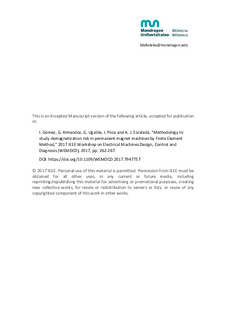
Izenburua
Methodology to Study Demagnetization Risk in Permanent Magnet Machines by Finite Element MethodEgilea (beste erakunde batekoa)
Argitalpen data
2017Beste erakundeak
Orona S.Coop.Bertsioa
PostprintaDokumentu-mota
Kongresu-ekarpenaKongresu-ekarpenaHizkuntza
IngelesaEskubideak
© 2017 IEEESarbidea
Sarbide irekiaArgitaratzailearen bertsioa
https://doi.org/10.1109/WEMDCD.2017.7947757Non argitaratua
IEEE Workshop on Electrical Machines Design, Control and Diagnosis (WEMDCD) Nottingham. 20-21 April. Pp. 262 - 267. IEEE, 2017Argitaratzailea
IEEEGako-hitzak
demagnetization
Magnetic flux
Finite element analysis
Magnetic circuits ... [+]
Magnetic flux
Finite element analysis
Magnetic circuits ... [+]
demagnetization
Magnetic flux
Finite element analysis
Magnetic circuits
Temperature measurement
Robustness
Torque [-]
Magnetic flux
Finite element analysis
Magnetic circuits
Temperature measurement
Robustness
Torque [-]
Laburpena
Nowadays the majority of applications are demanding more and more compact, cost effective and robust solutions for their electric drives. In this context permanent magnet synchronous machines are cons ... [+]
Nowadays the majority of applications are demanding more and more compact, cost effective and robust solutions for their electric drives. In this context permanent magnet synchronous machines are considered as a good candidate due to their high torque density. This torque density is obtained thanks to high power rare earth magnets with both high remanence and high coercive force. However, the magnets cost has a relevant impact in the final cost of the electrical machine and the uncertainty shown by the rare earth market in the last years has originated high variations in the price of them. Due to that, it is essential to reduce this impact in order to accomplish cost effective drive solutions. Some key points to face this problem are the reduction of the magnets volume or the using of magnets with worse thermal properties (magnets with few dysprosium and with low coercive force). In both cases special attention must be paid on the demagnetization risk of the magnets. To carry out that analysis, in this article a finite element method simulation analysis process for demagnetization of permanent magnets is presented. The developed method has been validated experimentally in a test bench. Good agreement is shown between simulations and experimental results. [-]




















